The title of the latest film directed by Jafar Panahi, which premiered in his absence at the 79th Venice Film Festival due to his imprisonment in Iran, sums up its theme perfectly. No Bears (Khers Nist, 2022) speaks of confinement, of a kind of forced reclusion that acts on several levels, and which prevents people from circulating, literally and metaphorically, as they please. Panahi’s bears are the same monsters that the community in M. Night Shyamalan‘s The Village (2004) invented to protect their children from the dangers of the world.
In the case of the Iranian, the metaphor drawn from folklore and intended to forge in children the beliefs of insecurity and the need for protection functions as a conceptual framework, which the director illustrates masterfully, with his characteristic minimalism and also through increasing forcefulness throughout the film.
The opening anecdote of No Bears is the stay of a film director, played by Panahi himself, in a small village on Iran’s border with Turkey. There, from a distance, he is directing a semi-documentary film about a couple of exiles who intend to travel illegally to Europe. At first, the landlord of the humble house he lives in is pleased to host an important personality, but little by little, the relationship with him, as mediator, and the rest of the neighbours, will become strained.
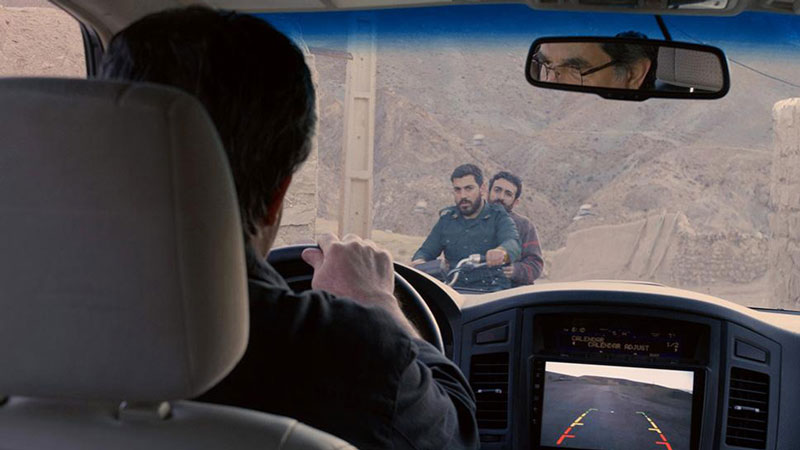
Gradually, the stranger will know that he is being watched and considered as an element to be controlled and to make it clear that his presence in the village is not acceptable at any price. This gradation is identifiable with the repression of citizens who, for example, are denied passports, jobs and finally freedom, as has been the case with Panahi himself and other Iranian filmmakers; just as the local council that decides on questions of coexistence is a court at scale, where sentences do not depend on the process. The external exile necessary to be able to work on his project, even if it is limited to a remote region and not to another country, reveals an inevitable rootlessness that hampers his work, and his life in short.
Finding himself, without seeking it, in the middle of a dispute over the social customs of a community paralysed by its customs, the protagonist tries to maintain his integrity as a Carlo Levi, finding himself involved in spite of himself in a situation that speaks not only of his fellow countrymen, but of a whole country, of a mentality. Like a foreign body, the director is isolated after several attempts to redirect his polite withdrawal from the conflict, his tolerant acceptance of the community’s demands, but his degree of assent is never enough.
Tradition, in its repetitive refrain, is such an arbitrary imposition that even the villagers make no effort to justify it: the marriage rites, the public oaths, the ancestral fear of imaginary bears waiting beyond the boundaries for those who dare to cross them. This suffocating, blocking tradition, guarantor of the status quo and social peace, is a moral prison, revealing the unbridgeable distance that separates the protagonist from his neighbours. The ways in which these absurd but effective rules are wrapped up show the extent to which the film director is an outsider in his surroundings, and is unacceptable to others, as are the members of this swarm – as we see at the end of the film – who, in one way or another, try to introduce an element of freedom or transgression, however legitimate it may seem to the spectator and the protagonist, but which is a refusal to live the lives of others.
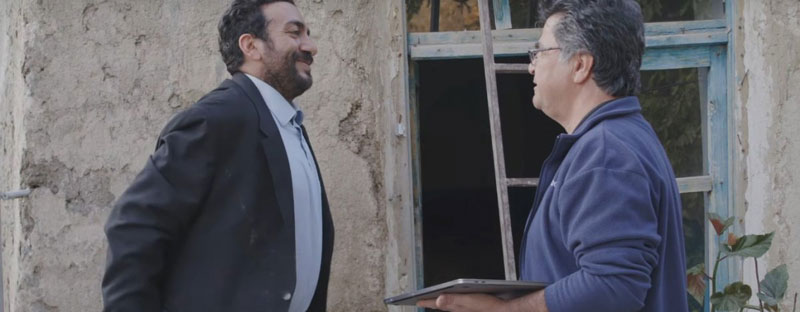
The formalities with which village life is woven are never innocuous, the circumlocutions with which local diplomacy weaves the web into which the interlocutor will fall, unable to detach himself from the demands with which they are concluded, have profound consequences and, over the course of the film, the progression becomes more and more suffocating. Moreover, this social confinement with the threat of expulsion is transferred to a higher dimension, which is the one that has confined the director to the country’s border, from which he cannot leave, but in which he literally goes to the legal extreme. Panahi also makes use, through an old woman, of the djinns, the goblins of pre-Islamic mythology, supernatural entities, who present themselves as both protective angels and demons, embodied in the ambivalence of his assistant or the people smugglers.
In a significant night scene, in which his assistant urges him to cross the border illegally – he has agreed to do so with the smugglers who informally guard the crossing, replacing the police – the director asks where the border is, he replies that he is just stepping over it and, startled, takes a step back, comes to his senses and retraces his steps. The physical evidence of what he perceived as a concept becomes a flickering neon that shows him his lack of freedom to leave the country, or even to live in an intolerant community.
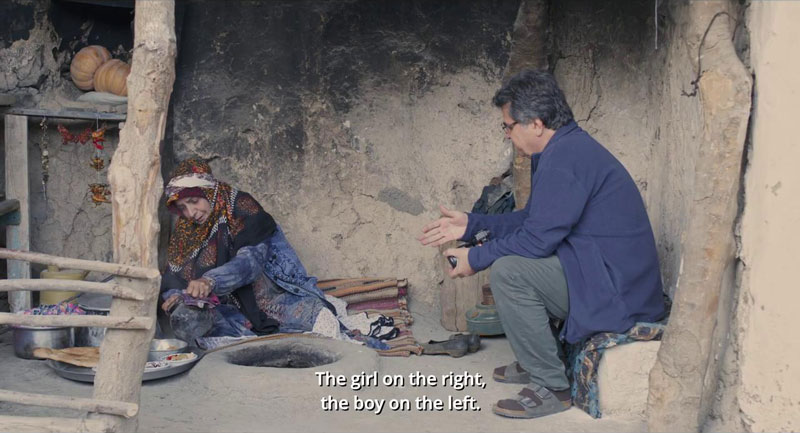
Even so, the filmmaker shoots his docudrama as best he can, with protagonists who, at the same time, are experiencing their own exodus. Zara has suffered imprisonment and torture, has been deported, but does not want to enter Europe without her partner. Finally, he gets a passport – hers belongs to a French tourist and is implied to be stolen – and they both prepare to leave, imitating the appearance of those they are impersonating – she pathetically made up with her red lips, bob and striped shirt under her blazer – but at the last minute, Zara discovers that his passport is patently false and that it has all been a ruse to pretend to accompany her and thus give her a chance to fulfil her dream.
In this climax of the drama within the drama, Zara shows us in a burst of ethics and solidarity that she does not want to harm a foreigner, that she does not want to abandon the man who will be left helpless without her company, and that his white lie (and manipulation) is a disloyalty worse than prison and torture. Integrity is the final frontier for Zara, which will ultimately lead her to a destination of no return, in a reflection on who need and desperation make us, and probably showing a moral stature that surpasses the holders of legal passports, who have closed the doors on her, time and time again.
The actors play their own impossibility to grow, to walk, to choose, and reality imposes itself on fiction, deciding their own end and, at the same time, the end of their film, in the same way that, out of their control, society also decides that the director cannot follow his work plan.
The camera always tells the truth, said Bertolucci, referring to the power of improvisation and the magic of the “supreme moment” that only the camera can capture, and Panahi corroborates this. Instead of attending an absurd wedding engagement ceremony on the river, the protagonist delegates to his landlord the task of filming it and showing it to him. Not quite understanding how the camera works, he confuses the functions and inadvertently records when he thought he had it turned off, revealing their conversation and what is actually thought of the stranger in the village. Panahi’s camera has given us in No Bears a new truth from art, that of the impotence of the repressed survivor, who can neither stay nor leave, in a paradox whose only resolution -until this moment- is the absolute deprivation of freedom.


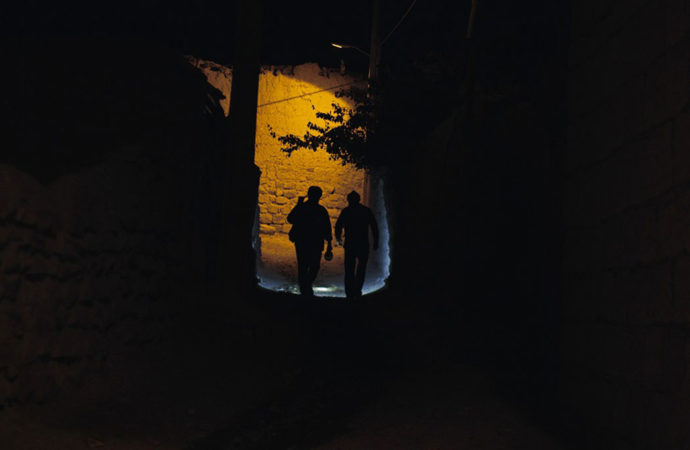


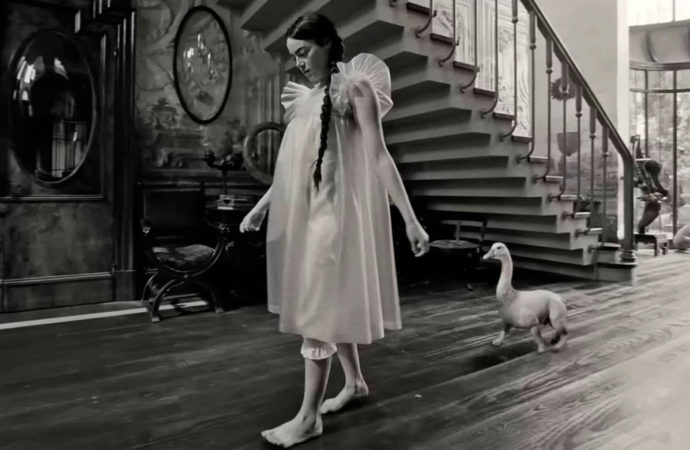
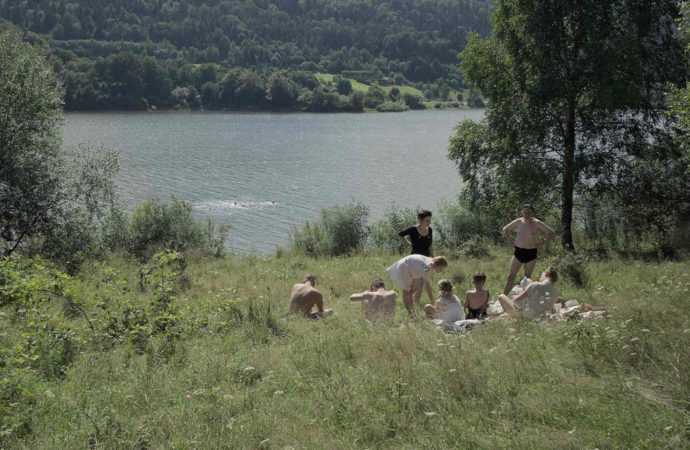
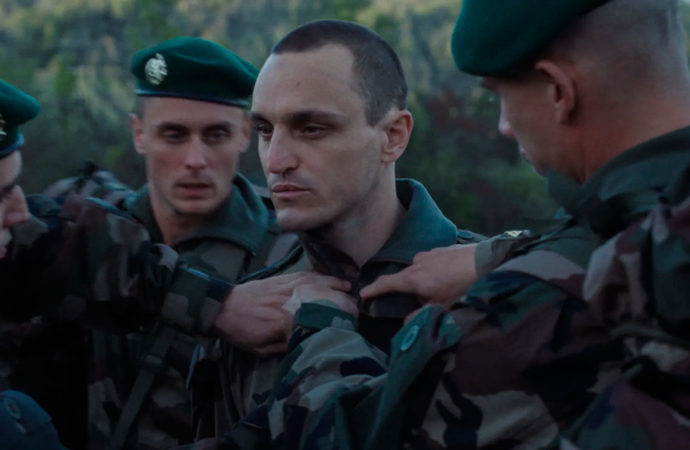



No one has posted any comments yet. Be the first person!